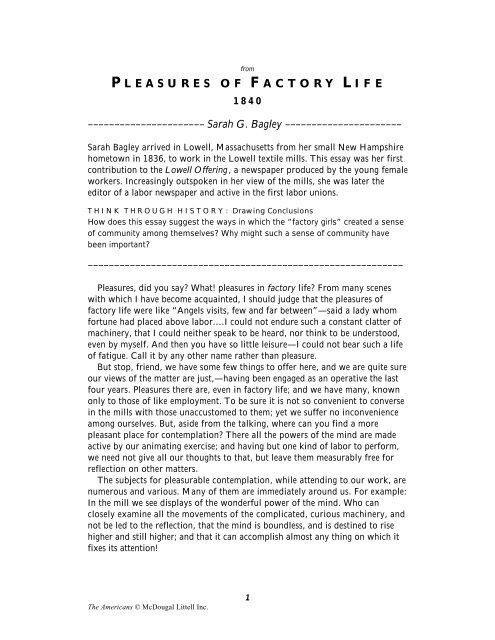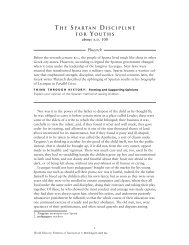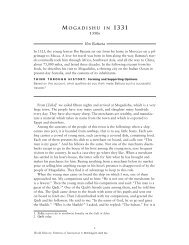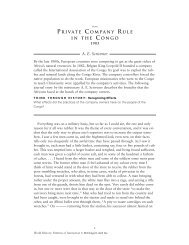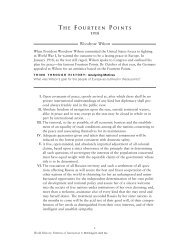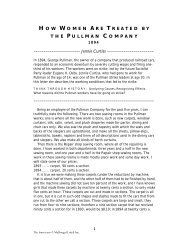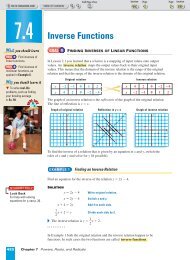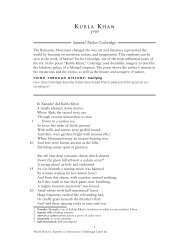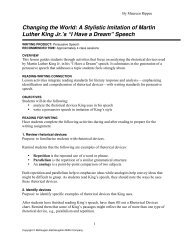from Pleasures of Factory Life - ClassZone
from Pleasures of Factory Life - ClassZone
from Pleasures of Factory Life - ClassZone
Create successful ePaper yourself
Turn your PDF publications into a flip-book with our unique Google optimized e-Paper software.
<strong>from</strong><br />
P L E A S U R E S O F F A C T O R Y L I F E<br />
The Americans © McDougal Littell Inc.<br />
1 8 4 0<br />
–––––––––––––––––––––– Sarah G. Bagley ––––––––––––––––––––––<br />
Sarah Bagley arrived in Lowell, Massachusetts <strong>from</strong> her small New Hampshire<br />
hometown in 1836, to work in the Lowell textile mills. This essay was her first<br />
contribution to the Lowell Offering, a newspaper produced by the young female<br />
workers. Increasingly outspoken in her view <strong>of</strong> the mills, she was later the<br />
editor <strong>of</strong> a labor newspaper and active in the first labor unions.<br />
T H I N K T H R O U G H H I S T O R Y : Drawing Conclusions<br />
How does this essay suggest the ways in which the “factory girls” created a sense<br />
<strong>of</strong> community among themselves? Why might such a sense <strong>of</strong> community have<br />
been important?<br />
––––––––––––––––––––––––––––––––––––––––––––––––––––––––––––<br />
<strong>Pleasures</strong>, did you say? What! pleasures in factory life? From many scenes<br />
with which I have become acquainted, I should judge that the pleasures <strong>of</strong><br />
factory life were like “Angels visits, few and far between”—said a lady whom<br />
fortune had placed above labor.…I could not endure such a constant clatter <strong>of</strong><br />
machinery, that I could neither speak to be heard, nor think to be understood,<br />
even by myself. And then you have so little leisure—I could not bear such a life<br />
<strong>of</strong> fatigue. Call it by any other name rather than pleasure.<br />
But stop, friend, we have some few things to <strong>of</strong>fer here, and we are quite sure<br />
our views <strong>of</strong> the matter are just,—having been engaged as an operative the last<br />
four years. <strong>Pleasures</strong> there are, even in factory life; and we have many, known<br />
only to those <strong>of</strong> like employment. To be sure it is not so convenient to converse<br />
in the mills with those unaccustomed to them; yet we suffer no inconvenience<br />
among ourselves. But, aside <strong>from</strong> the talking, where can you find a more<br />
pleasant place for contemplation? There all the powers <strong>of</strong> the mind are made<br />
active by our animating exercise; and having but one kind <strong>of</strong> labor to perform,<br />
we need not give all our thoughts to that, but leave them measurably free for<br />
reflection on other matters.<br />
The subjects for pleasurable contemplation, while attending to our work, are<br />
numerous and various. Many <strong>of</strong> them are immediately around us. For example:<br />
In the mill we see displays <strong>of</strong> the wonderful power <strong>of</strong> the mind. Who can<br />
closely examine all the movements <strong>of</strong> the complicated, curious machinery, and<br />
not be led to the reflection, that the mind is boundless, and is destined to rise<br />
higher and still higher; and that it can accomplish almost any thing on which it<br />
fixes its attention!<br />
1
FROM PLEASURES OF FACTORY LIFE<br />
In the mills, we are not so far <strong>from</strong> God and nature, as many persons might<br />
suppose. We cultivate, and enjoy much pleasure in cultivating flowers and<br />
plants. A large and beautiful variety <strong>of</strong> plants is placed around the walls <strong>of</strong> the<br />
rooms, giving them more the appearance <strong>of</strong> a flower garden than a workshop.<br />
It is there we inhale the sweet perfume <strong>of</strong> the rose, the lily, and geranium; and,<br />
with them, send the sweet incense <strong>of</strong> sincere gratitude to the bountiful Giver <strong>of</strong><br />
these rich blessings. And who can live with such a rich and pleasant source <strong>of</strong><br />
instruction opened to him, and not be wiser and better, and consequently more<br />
happy.<br />
Another great source <strong>of</strong> pleasure is, that by becoming operatives, we are<br />
<strong>of</strong>ten enabled to assist aged parents who have become too infirm to provide for<br />
themselves; or perhaps to educate some orphan brother or sister, and fit them<br />
for future usefulness. And is there no pleasure in all this? no pleasure in<br />
relieving the distressed and removing their heavy burdens? And is there no<br />
pleasure in rendering ourselves by such acts worthy the confidence and respect<br />
<strong>of</strong> those with whom we are associated?<br />
Another source is found in the fact <strong>of</strong> our being acquainted with some person<br />
or persons that reside in almost every part <strong>of</strong> the country. And through these we<br />
become familiar with some incidents that interest and amuse us wherever we<br />
journey; and cause us to feel a greater interest in the scenery, inasmuch as there<br />
are gathered pleasant associations about every town, and almost every house<br />
and tree that may meet our view.<br />
Let no one suppose that the ‘factory girls’ are without guardian. We are<br />
placed in the care <strong>of</strong> overseers who feel under moral obligations to look after<br />
our interests; and, if we are sick, to acquaint themselves with our situation and<br />
wants; and, if need be, to remove us to the Hospital, where we are sure to have<br />
the best attendance, provided by the benevolence <strong>of</strong> our Agents and<br />
Superintendents.<br />
In Lowell, we enjoy abundant means <strong>of</strong> information, especially in the way <strong>of</strong><br />
public lectures. The time <strong>of</strong> lecturing is appointed to suit the convenience <strong>of</strong> the<br />
operatives; and sad indeed would be the picture <strong>of</strong> our Lyceums, Institutes, and<br />
scientific Lecture rooms, if all the operatives should absent themselves.<br />
And last, though not least, is the pleasure <strong>of</strong> being associated with the<br />
institutions <strong>of</strong> religion, and thereby availing ourselves <strong>of</strong> the Library, Bible<br />
Class, Sabbath School, and all other means <strong>of</strong> religious instruction. Most <strong>of</strong> us,<br />
when at home, live in the country, and therefore cannot enjoy these privileges<br />
to the same extent; and many <strong>of</strong> us not at all. And surely we ought to regard<br />
these as sources <strong>of</strong> pleasure.<br />
Source: “<strong>Pleasures</strong> <strong>of</strong> <strong>Factory</strong> <strong>Life</strong>” by Sarah Bagley in Lowell Offering,<br />
December 1840 (Lowell, Mass., 1840).<br />
The Americans © McDougal Littell Inc.<br />
2


